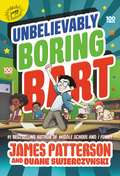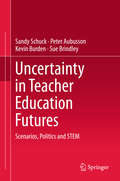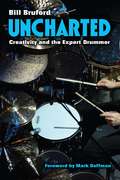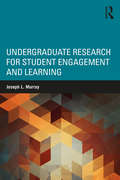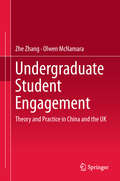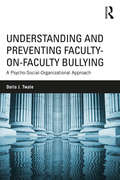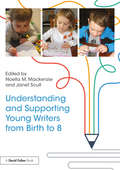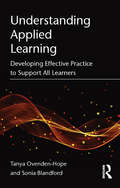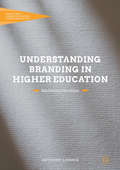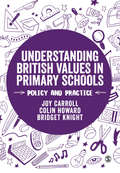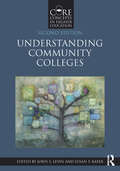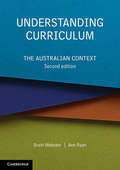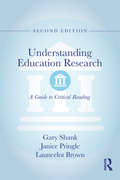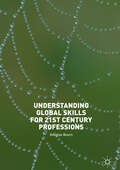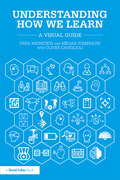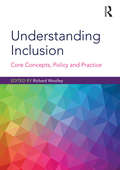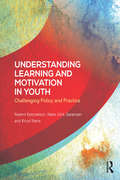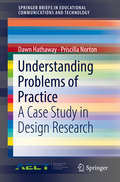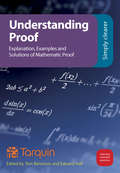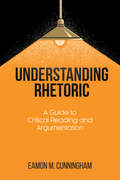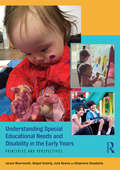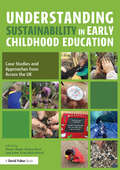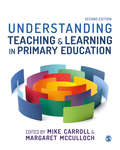- Table View
- List View
Unbelievably Boring Bart
by James Patterson Duane Swierczynski Xavier BonetThere's more than meets the eye in James Patterson's newest illustrated middle grade novel--a book so fun kids will actually put down their games to read it!Invisible creatures are attacking the school, and 12-year-old Bartholomew Bean is the only one who can stop them! Okay, so maybe Bart is only a hero in the video game app he created. But if he reveals his identity as the genius behind the game, he'll become the most popular kid in school! Or he could secretly use the game to get back at his bullies...Press Button A: RevealPress Button B: RevengeWhich would you choose?
Uncertainty in Teacher Education Futures: Scenarios, Politics and STEM
by Sue Brindley Kevin Burden Peter Aubusson Sandy SchuckThis book discusses the use of futures methodologies to examine and critique teacher education and investigate drivers of change in teacher education contexts, providing readers with futures tools that they can use to explore curricula and pedagogies. It explains futures methods, including scenario development and backcasting, and illustrates them with examples of research in science, technology and mathematics education contexts. By allowing the long-term influence of current trends to be considered and providing an opportunity to reflect on the present and imagine the future, scenarios provoke discussion on the directions that teacher education might take now. The book offers insights into the possibilities that might exist for teacher education futures and into how scenario building and planning can be used to inform debates about the present. Further, it suggests ways in which readers can influence the future of teacher education through understanding the drivers of change.
Uncharted: Creativity and the Expert Drummer
by Bill BrufordWhat do expert drummers do? Why do they do it? Is there anything creative about it? If so, how might that creativity inform their practice and that of others in related artistic spheres? Applying ideas from cultural psychology to findings from research into the creative behaviors of a specific subset of popular music instrumentalists, Bill Bruford demonstrates the ways in which expert drummers experience creativity in performance and offers fresh insights into in-the-moment interactional processes in music. An expert practitioner himself, Dr. Bruford draws on a cohort of internationally renowned, peak-career professionals and his own experience to guide the reader through the many dimensions of creativity in drummer performance.
Undergraduate Research for Student Engagement and Learning
by Joseph L. MurrayThere is growing interest in undergraduate research, given its benefits to students, faculty members, and the institution. For higher education scholars, faculty, and administrators, this book logically synthesizes the literature to demonstrate its impact on facilitation of learning and engagement and to chart a course for expanding and improving these opportunities. This book provides a comprehensive overview of undergraduate research as a "high-impact practice" in postsecondary education, from its theoretical underpinnings and research-base, to student participation and faculty incentives. This important resource offers analysis of the current state of undergraduate research, explores challenges and unresolved questions affecting undergraduate research, and provides implications for research and practice.
Undergraduate Student Engagement: Theory and Practice in China and the UK
by Zhe Zhang Olwen McNamaraThis book focuses on undergraduate student engagement in China and the UK. It offers an innovative perspective on this aspect, which, although pervasive, is not always acknowledged by its users to be complex and multidimensional in nature, firmly rooted in cultural, social and disciplinary norms, and difficult to measure. Competition within the global higher education market has become increasingly intense amongst universities; and the higher education sector in China, currently the largest source of international students, is beginning to compete strongly for its home market. Against this consumerist background, student engagement, with its close relation to positive learning outcomes, is increasingly receiving attention from higher education managers and researchers who seek to improve the quality of their ‘products’.The research study on which the book is based draws on three courses, two in China and one in the UK. It offers a binary perspective across two very different cultures (Western and Confucian) and two very different subject areas (Chinese language and mathematics). The study employs a mixed-methods design and develops a conceptual framework derived from statistical and thematic analysis. An original theoretical lens, combining a bioecological perspective (Bronfenbrenner) and a sociocultural one (Holland et al.’s Figured Worlds), adds further interpretive power to help understand the construct of student engagement.
Understanding and Preventing Faculty-on-Faculty Bullying: A Psycho-Social-Organizational Approach
by Darla J. TwaleUnderstanding and Preventing Faculty-on-Faculty Bullying provides a comprehensive understanding of workplace harassment, aggression, violence, bullying, and incivility in academia. Using a psychological, sociological, and organizational approach, this book explores the issue from the perspective of the individual, the department, and from the higher education organization. Providing research on the effects on victims and collegial culture, this important volume brings together interdisciplinary scholarship to present research-based suggestions for recovering from workplace bullying, recommendations for improving toxic academic environments, and practical advice about policy development to improve academic organizational culture and climate.
Understanding and Supporting Young Writers from Birth to 8
by Noella Mackenzie Janet ScullAs the world comes to grips with what it means to be literate in the twenty-first century, Understanding and Supporting Young Writers from Birth to 8 provides practitioners with the skills and knowledge they need to support young children effectively as they learn to write. Interweaving theory and research with everyday practice, the book offers guidance on all aspects of writing, from creating multimodal texts and building children’s vocabulary, to providing support for children who find writing particularly challenging. With appropriate strategies to develop young children’s writing from an early age included throughout, the book discusses the role of oral language in early writing in detail and explores the key relationships between ‘drawing and talking’, ‘drawing and writing’ and ‘drawing, talking and writing’. Each chapter also features samples of writing and drawing to illustrate key points, as well as reflective questions to help the reader apply ideas in their own settings. Further topics covered include: progressions in children’s writing writing in the pre-school years developing authorial skills developing editorial skills teaching writing to EAL learners. Understanding and Supporting Young Writers from Birth to 8 is a unique resource that will help early childhood educators, early years school teachers, specialist practitioners working with very young children, and students enrolled in Early Childhood or Primary Studies courses to boost their confidence in teaching young learners as they become writers.
Understanding Applied Learning: Developing Effective Practice to Support All Learners
by Tanya Ovenden-Hope Sonia BlandfordUnderstanding Applied Learning enables teachers, lecturers and educators to facilitate applied learning effectively with learners in schools, colleges and universities. It introduces teachers to the concept of applied learning in practice, cutting across any vocational and academic divide to show how this approach supports high-quality and effective outcomes for learners. Applied learning prepares and equips learners for life in the twenty-first century and lifelong learning. Offering practical guidance on why and how to adopt applied learning in all post-primary settings, this practical resource introduces and explores the core concepts, practices and benefits of using this approach. Illustrated with real-life scenarios, it examines why applied learning is relevant today, how it enables learners to connect knowledge with new situations, how to navigate and solve intellectual and skills-based problems and how to work collaboratively and develop higher-level thinking skills. Key topics covered include: A range of applied learning theories and strategies Relevant, Engaging, Active Learning (REAL) for successful knowledge and skills development The relevance of applied learning to employers Overcoming issues in embedding applied learning approaches How to embed creativity into learning experiences. Understanding Applied Learning is an authoritative, down-to-earth guide to facilitate applied learning effectively and successfully with students in secondary schools, colleges and universities. It is a source of support and inspiration for all those committed to high-quality and effective outcomes for learners.
Understanding Branding in Higher Education
by Anthony LowrieThis book provides a critical theory of branding in higher education. The author argues for a higher education for all and positions higher education as a human right necessary for the well-being of citizens and democracy. Firstly, the book introduces the concept of desire as an underpinning for brand theory. The author then uses an explication of the concept of relevance linked with desire to further our understanding of higher education as an emancipatory project. Chapter 4 explores brand identity, which is shown to be a retroactive investment of naming. Mathemes are used to illustrate the theory of naming in identity formation. Finally, the author also examines the idea of the liberal arts and provides an ethnographic and critical discourse analysis of the liberal arts college.
Understanding British Values in Primary Schools: Policy and practice (Transforming Primary QTS Series)
by Joy Carroll Colin Howard Bridget KnightSchools must actively promote the fundamental British values of democracy, the rule of law, individual liberty, mutual respect and tolerance of those with different faiths and beliefs. The Teachers' Standards make it clear that teachers themselves must do nothing to undermine these fundamental British Values. So how do schools and teachers provide educational experiences for primary aged children that explore and promote these values? This text provides trainees, teachers and schools with practice-based advice, informed by current practitioners, relating to the delivery of ‘British Values. The content covers many topical themes and provides a unique insight into delivering ‘British Values’ in schools. It supports educational professionals to understand their duties around the PREVENT agenda and goes further to explore why this is important. It helps trainees and teachers to see how these 'values' fit within the wider context of education and what we value as educators.
Understanding British Values in Primary Schools: Policy and practice (Transforming Primary QTS Series)
by Joy Carroll Colin Howard Bridget KnightSchools must actively promote the fundamental British values of democracy, the rule of law, individual liberty, mutual respect and tolerance of those with different faiths and beliefs. The Teachers' Standards make it clear that teachers themselves must do nothing to undermine these fundamental British Values. So how do schools and teachers provide educational experiences for primary aged children that explore and promote these values? This text provides trainees, teachers and schools with practice-based advice, informed by current practitioners, relating to the delivery of ‘British Values. The content covers many topical themes and provides a unique insight into delivering ‘British Values’ in schools. It supports educational professionals to understand their duties around the PREVENT agenda and goes further to explore why this is important. It helps trainees and teachers to see how these 'values' fit within the wider context of education and what we value as educators.
Understanding Community Colleges (Core Concepts in Higher Education)
by John S. Levin and Susan T. KaterUnderstanding Community Colleges provides a critical examination of contemporary issues and practices and policy of community colleges. This contributed volume brings together highly respected scholars as well as new scholars for a comprehensive analysis of the community college landscape, including management and governance, finance, student demographics and development, teaching and learning, policy, faculty, and workforce development. At the end of each chapter, the "Questions for Discussion" section helps to bridge the gap between research and practice. Written for students enrolled in higher education and community college graduate programs, as well as social sciences scholars, this provocative new edition covers the latest developments in the field, including trends in enrollment, developmental education, student services, funding, and shared governance.
Understanding Curriculum: The Australian Context
by Scott Webster Ann RyanUnderstanding Curriculum is a critical introduction to contemporary curriculum theory and practice. Substantially revised, the second edition includes more detailed consideration of the ideological underpinnings of curriculum development, features new chapters on assessment and reporting, and updated vignettes and extracts. These features, combined with all the elements of the previous edition, encourages readers to reflect on how curriculum theory can inform and enhance classroom practice.
Understanding Education Research: A Guide to Critical Reading
by Gary Shank Janice Pringle Launcelot BrownUnderstanding Education Research, 2nd Edition is designed to help students learn to read educational research articles carefully, systematically, and critically. Readers will learn how to categorize titles, decode abstracts, find research questions, characterize research arguments, break down methods and procedures, explore references, apply analysis strategies, and interpret findings. This textbook and quick reference guide allows students to easily develop the skills they need to become research literate and the 2nd edition has been updated throughout to offer simple guidelines for qualitative, quantitative, and statistical approaches and up-to-date information on complex and confusing methodologies.
Understanding Global Skills for 21st Century Professions
by Douglas BournThis book highlights the increasing need for people who will be working in professions such as teaching, health, engineering and business management to have the skills for living and working in a global society. Globalisation and the challenges resulting from recent political events in Europe and North America have given rise to a need for training and further and higher education programmes to address the skills young people all need to effectively engage in the current global society. Reviewing the range of theories and debates surrounding skills for the twenty-first century, the author suggests there is a need to directly address the real-world issues of today and move beyond abstract concepts such as team work, critical thinking and problem solving, as important as these concepts are. The author proposes a new framework for global skills using examples from international and national policy-makers and evidence from further and higher educational programmes and training courses. This pioneering yet practical book will be of value to students and scholars of global education as well as practitioners and policy makers.
Understanding How We Learn: A Visual Guide
by Yana Weinstein Megan Sumeracki Oliver CaviglioliEducational practice does not, for the most part, rely on research findings. Instead, there’s a preference for relying on our intuitions about what’s best for learning. But relying on intuition may be a bad idea for teachers and learners alike. This accessible guide helps teachers to integrate effective, research-backed strategies for learning into their classroom practice. The book explores exactly what constitutes good evidence for effective learning and teaching strategies, how to make evidence-based judgments instead of relying on intuition, and how to apply findings from cognitive psychology directly to the classroom. Including real-life examples and case studies, FAQs, and a wealth of engaging illustrations to explain complex concepts and emphasize key points, the book is divided into four parts: Evidence-based education and the science of learning Basics of human cognitive processes Strategies for effective learning Tips for students, teachers, and parents. Written by "The Learning Scientists" and fully illustrated by Oliver Caviglioli, Understanding How We Learn is a rejuvenating and fresh examination of cognitive psychology's application to education. This is an essential read for all teachers and educational practitioners, designed to convey the concepts of research to the reality of a teacher's classroom.
Understanding Inclusion: Core Concepts, Policy and Practice
by Richard WoolleyUnderstanding Inclusion is a rich, comprehensive exploration of inclusion in education, challenging us to think about being ‘inclusive’ in its broadest sense. It unpicks a wide range of complex themes and issues that impact on educational practice, supporting educational professionals in helping teachers and learners understand difference as the norm, and not the exception. Underpinned by the latest research, discussion is brought to life through vignettes of real experiences and examples of practice from a range of settings and across continents. Chapters consider crucial aspects of inclusion: Social inclusion and social class Global perspectives on culture and identity Aspirations and social mobility Relationships and sexual behaviours Gender equality and diversity Perceptions of ability and disability Barriers to learning Multilingualism in schools Religion and belief Restorative justice for inclusion Inclusion and the arts Teaching Assistants and inclusion The central role of leadership. Written by experts with extensive experience in a range of educational contexts, Understanding Inclusion is designed for all those engaged in understanding the complexities of teaching and learning. With reflective questions and selected reading designed to support further study, it will be essential reading for students on Education Studies and related course, and pre- and in-service teachers.
Understanding Learning and Motivation in Youth: Challenging Policy and Practice
by Knud Illeris Noemi Katznelson Niels Ulrik SørensenThrough interviews with a selection of the most qualified and well-reputed Northern European researchers, Understanding Learning and Motivation in Youth explores, and offers a range of solutions to, one of the central problems in modern education: motivation for learning. The way that teaching is currently delivered to students aged 11–19 often does not support positive learning; the ongoing encouragement to produce as much competence as possible at the lowest possible costs elicits critical conditions for learning processes, endangering not only the motivation of students, but also the engagement and motivation of teachers themselves. This book examines how this can be handled in practice by teachers and educators, drawing on the perspectives of carefully selected experts to provide an introduction to the debates surrounding neoliberal education, as well as a means to counteract the damages in their everyday teaching and activities. With an original and accessible format and a unique insight into the thoughts of a select group of academics, Understanding Learning and Motivation is essential reading for students, researchers and academics studying the effects of neoliberal education, as well as practicing teachers and educational leaders who are attempting to combat the problem.
Understanding Problems of Practice: A Case Study In Design Research (Springerbriefs In Educational Communications And Technology Ser.)
by Dawn Hathaway Priscilla NortonToday, K-12 practitioners are challenged to become educational innovators. Yet, little is available to the practitioner to guide their reflection about the design, development, and implementation of these innovations in their own practice. This brief approaches such problems of practice from the perspectives of design research. Although design research typically centers on the partnership between researchers and practitioners in real-world settings, relationships between researchers and practitioners are not always practical. In this brief, the authors explore how the design research process can make the goals, assumptions, processes, methods, and outcomes of design research uniquely accessible to the practitioner. In clear, explicit language, it introduces design research to practitioners using both expository discussions and a robust narrative case study approach that ably guides the reader through the phases of design research, namely:Theory to innovation to practiceUnderstanding problems of practiceCreating a design solutionAssessing the design solutionEvaluating learning outcomesCapturing lessons for practiceUnderstanding Problems of Practice is a singular resource for teachers and practitioners enrolled in graduate research courses or courses on teacher leadership. It also lends itself well as a supplement to professional development activities and studies at the district, school, and professional learning community levels.
Understanding Proof: Explanation, Examples and Solutions of Mathematical Proof
by Ed Hall Tom BennisonProof is central to any mathematics curriculum and indeed, all mathematical thinking. Now we are delighted to provide an International Edition of our guide to proof for students...and for their teachers too. Contents: 1. Introduction to proof 2. Exploring Methods of Proof 3. Mathematical Language 4. Direct Proof 5. Indirect Proof 6. Proof by Induction 7. Proof and Applications of Pythagoras' Theorem 8. Proof in Calculus 9. Proving Trigonometric Identities 10. Proof in Statistics and Probability 11. Worked Solutions
Understanding Rhetoric: A Guide to Critical Reading and Argumentation
by Eamon M. CunninghamUnderstanding Rhetoric: A Guide to Critical Reading and Argumentation is a composition textbook that outlines three essential skills – rhetoric, argument, and source-based writing – geared towards newcomers and advanced students alike. Though comprehensive in its coverage, the book’s focus is a simple one: how to move beyond a 'gut reaction' while reading to an articulation of what is effective and what is not, while explicitly answering the most important question of 'Why?' This text gets at this central concern in two fundamental ways.First, the text teaches composition as a cumulative process, coaching you how to question, challenge, and expand on not just the readings you hold in your hands, but also how to interrogate the internal processes of writing and thinking. The book's blend of composition methods detail the cross-point of product and process to turn reading and writing from a matter of coming up with answers to questions to learning what type of questions need to be asked in the first place. The 'right' questions, the text argues, are fundamentally rhetorical in nature.Second, the content of the practice-based chapters is framed into a larger mesh of intellectual history to show how the writing and thinking you are doing today is continuous with a long history of writing instruction that goes back to the ancient world. This book provides equal representation from classical and contemporary theory with the recognition that theory cannot be fully grasped without practice, and practice cannot be fully understood without its theoretical antecedent. After all, you can’t write 'outside the box' until you know where the box is and what it looks like.REVIEWS and WORDS OF PRAISE'Understanding Rhetoric is a timely resource. The challenge for good, careful writing and logical speaking and argumentation remains a task for postmodern education. This historically and philosophically grounded work is well written and presented in a way that is most helpful to both student and teacher alike. Understanding Rhetoric deserves a place in every high school and college classroom and resource library.'James B. Flynn, Ph.D., is a philosopher of education at Framingham State University in Massachusetts.'Spanning centuries of writing from classical philosophers to modern US Presidents, the text systematically addresses analysis and composition using both the technical, formal terms of writing as well as colloquialisms.… The text not only explains the process of analysis and writing, it provides detailed and varied examples of both. User-friendly, this text could readily be adopted and used for both college and high school-level composition courses; the teacher need only to begin on page one and the course curriculum would be complete.'Susanne Bronstein is the English Department Chair at Ashland High School in Massachusetts'Understanding the importance and power of language is more relevant than ever. Cunningham's book -- part informational text, part historical narrative, part handbook--is a critical guide for all students of rhetoric. Each chapter builds on those which precede it, encouraging readers to break away from formulaic processes to really understand, respond to, and control language in the process. The skills in this book are not important just in English classes but in all disciplines.'Erin Timlin is an AP English Language & Composition teacher at Marshfield High School in Massachusetts'Cunningham provides teachers and their students with tools to discern the deepest levels of meaning situated within the domain of authorial intent through technique, style, and argument. This approach, grounded in theory, structured in application, re-asserts the why of critical reading and writing as processes instead of mere products.'Tom O'Toole, Ed.D, is the Director of Humanities at Essex North Shore Agricultural and Technical High School in Massachusetts'Understanding Rhetoric is a helpful resource for any instructor of composition and will serve as an excellent textbook for college-level writing courses. In clear, student-friendly c
Understanding Special Educational Needs and Disability in the Early Years: Principles and Perspectives
by Janice Wearmouth Abigail Gosling Julie Beams Stephanie DavydaitisThis key text provides essential tools for understanding legislation, policy, provision and practice for children in the early years, particularly young children with special educational needs and disability (SEND). Based on extensive research and the four areas of need as defined in the Special Educational Needs and Disability Code of Practice: 0 to 25 Years (DfE, 2015), the book charts the development of young children and their growing constructions of learning, communication, language, motor movement and emotion.Providing material that translates into practice in a straightforward and practical way, this text is packed full of personal accounts and case studies, enabling readers to appreciate what the experience of SEND in the early years means for families and professionals, and also to learn more about how they might understand and respond appropriately to a child’s needs. Understanding Special Educational Needs and Disability in the Early Years will be of interest to students studying Early Years courses, families, SENDCOs, teachers and other staff supporting young children with a range of special educational needs and disabilities.
Understanding Sustainability in Early Childhood Education: Case Studies and Approaches from Across the UK
by Diane Boyd Nicky Hirst John Siraj-BlatchfordThis unique book explores research related to education for sustainability within early childhood education in the United Kingdom. Divided into the four home nations, it examines what education for sustainability looks like in practice, discusses the different application and positions of each region, and considers the contribution of early childhood education to support the Sustainable Development Goals. Each chapter considers the relevant early years framework and includes associated case studies which highlight connections between statutory guidance, policy and positive early years pedagogical practice. The authors use an education for sustainability lens to explore the critical issues and explicit and implicit links embedded in each of the curricula frameworks. Each chapter acknowledges the context of outdoor learning with discussion related to different interpretations of ecological sustainability. This exploration should help readers to consider the idea of sustainability within early childhood education. The book considers early childhood education as a distinct and valuable phase beyond the readiness for school discourse and recognises the importance of having skilful and knowledgeable adults to work with young children from birth. It offers a unique resource for students, practitioners, leaders and researchers engaged in the study of education for sustainability in early childhood and the importance of the early years for the development of life-long pro-environmental attitudes.
Understanding Teaching and Learning in Primary Education
by Mike Carroll Margaret McCullochThis textbook gives you guidance and insights into the knowledge, values and commitments necessary to succeed in the primary classroom, supported by links to theory and research literature and realistic scenarios you may encounter as a new teacher. Fully updated throughout, key features of this second edition include: · A new chapter on inclusive education · Newly expanded coverage of digital learning, engaging with educational research and the role of the primary teacher · New ‘View from Practice’ examples · Cross-referenced links to the Teachers’ Standards in England and the GTCS Professional Standards in Scotland and where they are covered within the book This is essential reading for professional studies modules on primary initial teacher education courses, including university-based (PGCE, PGDE, BA QTS, BEd), school-based (SCITT, School Direct) and employment-based routes into teaching.
Understanding Teaching and Learning in Primary Education
by Mike Carroll Margaret McCullochThis textbook gives you guidance and insights into the knowledge, values and commitments necessary to succeed in the primary classroom, supported by links to theory and research literature and realistic scenarios you may encounter as a new teacher. Fully updated throughout, key features of this second edition include: · A new chapter on inclusive education · Newly expanded coverage of digital learning, engaging with educational research and the role of the primary teacher · New ‘View from Practice’ examples · Cross-referenced links to the Teachers’ Standards in England and the GTCS Professional Standards in Scotland and where they are covered within the book This is essential reading for professional studies modules on primary initial teacher education courses, including university-based (PGCE, PGDE, BA QTS, BEd), school-based (SCITT, School Direct) and employment-based routes into teaching.
